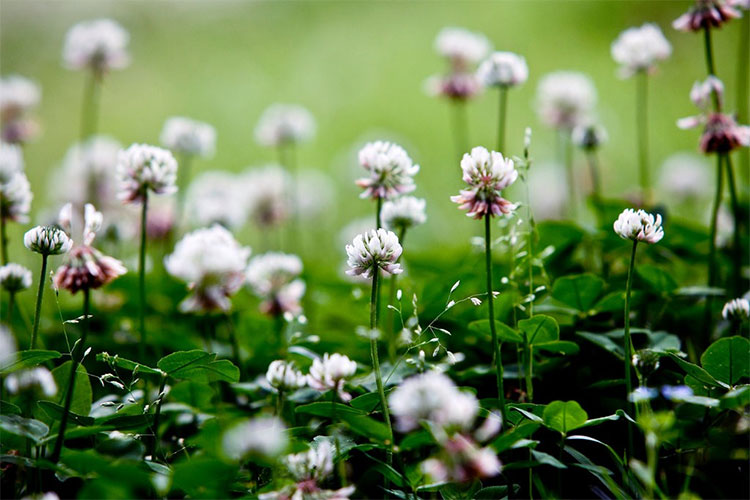White flower clover - Wild plant or evolutionary mystery?
White flower clover is capable of growing strongly even in harsh living conditions. This is a vital factor when their current living environment is continuously narrowed due to urbanization.
The clover of white flowers - the thorn in the gardener's eyes
White flower clover is considered a troublesome weed because of its ability to grow and grow quickly. They grow "illegally" in suburban green lawns and are thorns in the eyes of gardeners.

White lilies are one of the fastest growing and fastest plants.(Photo: Mirai Takahashi).
But on the other hand, this plant is also appreciated by its ability to grow and adapt quickly to survive in even the harshest ecological environment in urban areas. The gardeners are no stranger to their powerful dispersal through attracting bees, not to mention that they can grow through walls and rocks.
According to a study published recently in the scientific journal Proceedings of the Royal Society B, white flower clover quickly adapts to cities of all sizes. The study included 20 studies in Ontario (Canada), from London (England) - with a population of 400,000 trees, to a population of 1,670 plants in Everett (Washington, USA). In the Global Urban Evolution Project (GLUE) effort, researchers conducted surveys in major cities like New York and expanded to more than 180 cities. Around the world.
'The city is the perfect test place for the evolution of organisms. By many different forms, this process has taken place all over the world without human intervention ' - Marc Johnson - Director of Urban Environment Center University of Toronto, Mississauga, Head of Project project, said.
With increasing climate change and urban population boom - more than 50% of the world's population lives in cities and is expected to reach 70% by 2050, Dr. Johnson said. Scientists are required to study the extent of human influence as well as social activities on surrounding plants and animals.
Change to adapt to the expansion of cities
White clover is a suitable plant to carry out research by resisting and surviving in different climates from Norway to South India - according to Johnson. This species nourishes soil with nitrogen, and is an important source of nectar for bees and other pollinators.

This plant nourishes soil with nitrogen, and is an important source of nectar for bees and other pollinators.
Alfalfa adapts to the cold climate by eliminating the ability to produce hydrogen cyanide (HCN) - a type of plant toxin that protects itself from enemies such as snails, insects, mice, cows, sheep and goats. The study showed that the number of species producing cyanide hydrogen tends to increase when away from the city center - regardless of whether the city is big or small.
According to Dr. Johnson, white clover grows in urban areas almost impossible to produce Hydro Xianua. Although the temperatures in cities may be higher than in rural areas, in fact, the main cause of urban snow is less than in rural areas due to human life. When there is no snow to keep the tree insulated, clover will poison itself with its own ability to produce hydrogen cyanide.
After Darwin, researchers identified three main factors that affect evolution: natural selection, random factors and gene flow. According to Johnson, research has demonstrated that natural selection is a key factor influencing the evolutionary process of adapting to the urban ecological environment of clover populations.
"This is the first study to really clarify the question: What factors play a key role in the three evolutionary factors of city populations," he said.
Dr. Anne Charmantier, evolutionary ecologist - who is not involved in the study, said: 'Scientists have only focused on the evolution of urban populations for several years. recently. We only know very little about changes in traits that meet natural selection in urban ecological environment. This study provides an objective source of information about the evolutionary process in many ecological environments that are rapidly changing. "
Another evolutionary biologist - Jonathan Losos, Washington University, St. Louis, Director of The Living Earth Collaborative, said he was impressed with the adaptability of the white clover population.'We were wrong to think that evolution was very slow. The fact is, the stronger the natural selection, the more adaptable species are, " he said.
- Accidentally picked up the
- Bustling 'Tet flowers' in the Capital
- Video: 'The white flower' is bloodthirsty
- 6 exotic animal-like flowers
- The most beautiful natural photos in 2011
- The first flowering tree in the world lives in China
- Interesting things about flowers
- Me looking at the white lilies in April
- Watch dandelions sparkling in the wind
- Instructions on how to plant dahlia flowers to bloom on Tet holiday
- Why did the Qing monks always wear a white silk scarf on their necks?
- The world's rarest flower ever lost Darwin's whole life
 Why do potatoes have eyes?
Why do potatoes have eyes? 'Tragedy' the world's largest carnivorous life: Death becomes ... public toilet
'Tragedy' the world's largest carnivorous life: Death becomes ... public toilet Tomatoes were once considered 'poisonous' for 200 years
Tomatoes were once considered 'poisonous' for 200 years Detecting microscopic parasites on human face
Detecting microscopic parasites on human face